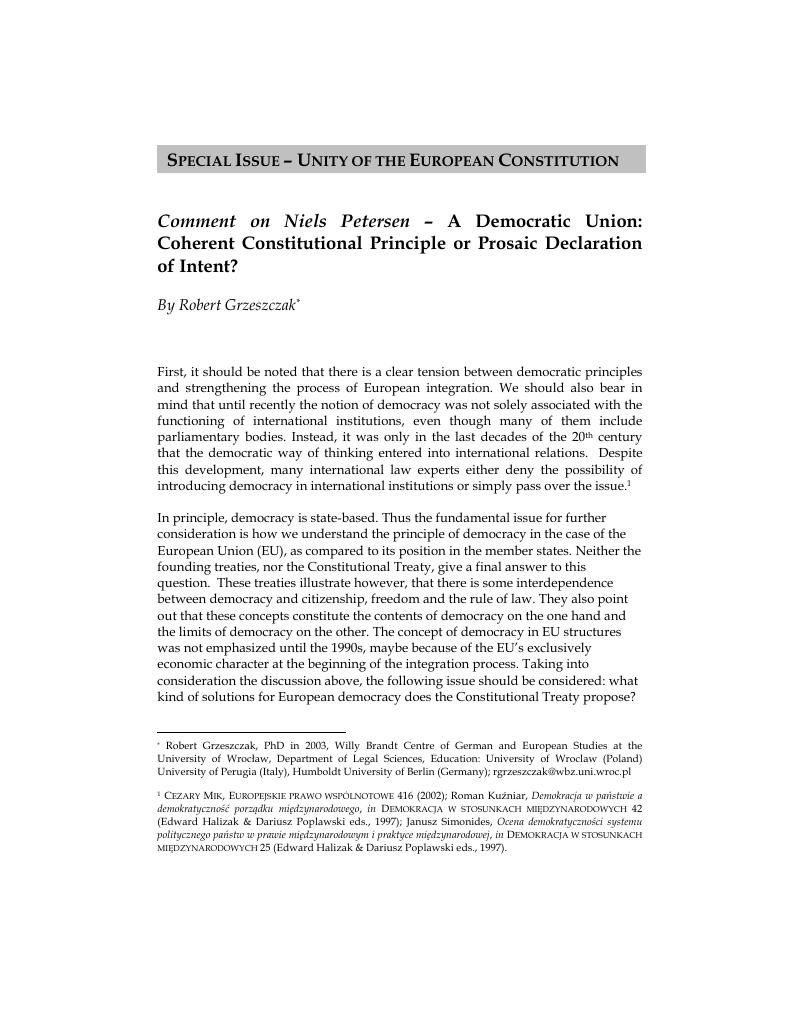No CrossRef data available.
Published online by Cambridge University Press: 06 March 2019

1 Cezary Mik, Europejskie prawo wspólnotowe 416 (2002); Roman Kuźniar, Demokracja w państwie a demokratyczność porządku międzynarodowego, in Demokracja w stosunkach mędzynarodowych 42 (Edward Halizak & Dariusz Poplawski eds., 1997); Janusz Simonides, Ocena demokratyczności systemu politycznego państw w prawie międzynarodowym i praktyce międzynarodowej, in Demokracja w stosunkach międzynarodowych 25 (Edward Halizak & Dariusz Poplawski eds., 1997).Google Scholar
2 Compare Treaty Establishing the European Constitution Title VI, Dec. 16, 2004, 2004 O.J. (C 310) 1 [hereinafter CT] (The Democratic Life of the Union); and Constitutional Treaty art. I-46 (the Principle of Representative Democracy).Google Scholar
3 Lexikon des Rechts, I/57 and I/58 (A. Reifferscheid, E. Bockel & F. Benseler eds., 1968).Google Scholar
4 Philippe Weber–Panariello, Nationale Parlamente in der Europäischen Union: eine rechtsvergleichende Studie zur Beteiligung nationaler Parlamente an der innerstaatlichen Willensbildung in Angelegenheiten der Europäischen Union im Vereinigten Königreich, Frankreich und der Bunderepublik Deutchland 194 (1995).Google Scholar
5 Compare Montesquieu, O duchu praw 239 (1957), with Heinrich Oberreuter, Demokratiedefizite in der EU, 54 Politische Studien 50 (1999) (“[…] Die EU ist kein Staat. Sie ist eine Gebilde sui generis, was der Begriff Staatenverbund zutreffend umschreibt. Institutionen und Verfahrensweisen in diesem Verbund waren immer schon nach Maß zu schneidern, nie nach einzelstaatlichem Vorbild”).Google Scholar
6 David Coombes, Seven Theorems in the European Parliament. Future of European Parliamentary Democracy (1999); Albert Bleckmann, Das europäische Demokratieprinzip – Zum Demokratieprinzip in der EG 301, 7 Juristen Zeitung 30 (1990); Winfried Kluth, Die demokratische Legitimation der Europäischen Union 87 (1995); Albert Bleckmann, Chancen und Gefahren der europäischen Integration. Zum Demokratieprinzip in der EG 301, 7 Juristen Zeitung (1990); Klaus Pöhle, Das Demokratiedefizit der Europäischen Union und die nationalen Parlament, 1 Zeitschrift fűr Parlamentsfragen 77 (1998); Dieter Grimm, Mit einer Aufwertug des Europa-Parlaments ist es nicht getan. Das Demokraiedefizit der EG hat strukturelle Ursachen, 6 Jahrbuch zur Staats- und Verwaltungswissenschaft (1992-1993); Frank Decker, Demokratie und Demokratiesierung jenseits des Nationalstaates: Das Beispiel der Europäischen Union, 2 Zeitschrift fűr Politikwissenschaft 177 (2000); Frank Emmert, Mateusz Morawiecki, Prawo europejskie 170 (2004).Google Scholar
7 Albert Bleckmann, , Das europäische Demokratieprinzip, 2 Juristen Zeitung 53 (2001).Google Scholar
8 Grażyna Michałowska, Społeczne przesłanki demokracji w stosunkach międzynarodowych, in Pañstwo, demokracja, samorząd 449 (Tadeusz Mołdawa ed., 1999).Google Scholar
9 Id. at 358.Google Scholar
10 Szwarc, Monika, Zasady wglądu do dokumentów instytucji Wspólnot Europejskich, in Państwo i Prawo 34 (2001).Google Scholar
11 They have been most broadly considered in the legal orders of the Scandinavian states.Google Scholar
12 However, the EU solutions must have reached a consensus on different member states traditions and create a model incorporating on the one hand exceptionally transparent solutions of the Scandinavian states.Google Scholar
13 Commission Regulation 1049/2001, 2001 O.J. (L 145) 43.Google Scholar
14 Fragde, M., Sovranità diffuse e diritti umani nella prospettiva comunitaria, in Rivista di diritto europeo 19 (1999).Google Scholar
15 Hilf, Meinhard, Amsterdam – Ein Vertrag fűr die Bűrger?, in Europarecht 357, 358 (G. Nicolaysen & H.J. Rabe eds., 1997).Google Scholar
16 The father of the theory of deliberative democracy is Jürgen Habermas. See Jürgen Habermas, Strukturwandel der Öffentlichkeit (1961).Google Scholar
17 Klaus Bachmann, Konwent o przyszłości Europy. Demokracja deliberatywna jako metoda legitymizacji władzy w wielopłaszczyznowym systeme politycznym 51 (2004).Google Scholar
18 Id. at52.Google Scholar
19 Andrzej Redelbach, Sławomra Wronkowska & Zenon Ziembiński, Zarys teorii państwa i prawa 56 (2003); N. Biblio, The Future of democracy 42 (1987).Google Scholar
20 Andrzej Wasilkowski, Suwerenność w prawie międzynarodowym i w prawie europejskim (2003).Google Scholar
21 BVerfGE 89, 155 (F.R.G) (the judgment known as Maastricht – Urteil).Google Scholar